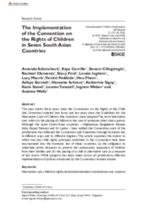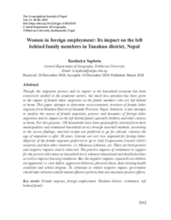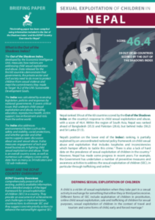This country page features an interactive, icon-based data dashboard providing a national-level overview of the status of children’s care and care reform efforts (a “Country Care Snapshot”), along with a list of resources and organizations in the country.
demographic_data
childrens_living_arrangement
children_living_without_bio
adoption
social_work_force
key_stakeholders
Key Stakeholders
Add New DataOther Relevant Reforms
Add New Datadrivers_of_institutionalisation
Drivers of Institutionaliziation
Add New Datakey_research_and_information
Key Data Sources
Add New DataAct Relating to Children 2018 - Nepal
Trafficking in Persons Report June 2018
Country Care Review: Nepal
Acknowledgements
Data for this country care snapshot was contributed by Forget Me Not and UNICEF Nepal.
Displaying 31 - 40 of 140
This launch webinar provided an introduction to the Transitioning Models of Care Assessment Tool, an assessment framework that assists practitioners to identify and analyze key starting point dynamics and determine the implications for strategy in supporting organisations to transition from an institutional to non-institutional model of care.
This article explores care leavers’ views and recommendations for practitioners and policymakers on the transition from leaving care to living independently in the community. The article outlines how children and young people affected by child sexual exploitation experience community reintegration, and their views on the key issues reintegration services need to consider.
Nepal's Minister of Women, Children, and Senior Citizen, Parbat Gurung, "interacted with children during Save the Children and Community Information Network’s (CIN) ‘Ministers with Children’ - a campaign designed to elevate the voices of children in COVID-19 discussions, with the aim to make elected representatives and policy-makers more accountable towards the need and challenges of children in Nepal," according to this press release from Save the Children.
This article examines the extent to which two key child rights principles enshrined in the Convention have been incorporated into the domestic law of seven South Asian countries: (a) the obligation to undertake active measures to prevent the unnecessary separation of children from their families and (b) the placing of a child in alternative care as a measure of last resort.
In this opinion piece for ABC News, Kate van Doore describes her experience of establishing an orphanage in Nepal in 2006, to later learn that the children in the home's care had living relatives and that many had been recruited to the orphanage.
This episode of Foreign Correspondent from ABC News in Australia exposes the "ugly truth" that donations and volunteer efforts of Westerners, including Australians, often drive an exploitative orphanage industry in developing countries (in this case, Nepal).
This article accompanies an episode of Foreign Correspondent from ABC News Australia entitled 'Paper Orphans.' It tells the story of Devi, a 10-year-old girl in Nepal "forced to pose as an orphan" who is being reunited with her family.
This paper attempts to determine socio-economic structure of female labor migrants from Tanahun District of Gandaki Province, Nepal. Similarly, it also attempts to analyze the causes of female migration, process and dynamics of foreign labor migration and its impact on the left behind family specially children and elder citizens at home.
"Orphanage tourism turns children into cash-generating commodities subject to the usual economic laws of supply and demand," says this article from New Europe.
This briefing paper has been compiled using information included in the Out of the Shadows Index - which measures a country’s response to child sexual exploitation and abuse - and the ECPAT Country Overview for Nepal. The brief highlights the risk of sexual exploitation resulting from voluntourism practices, including volunteering in or visiting orphanages.



